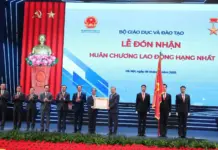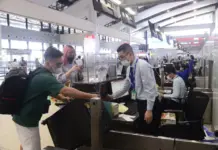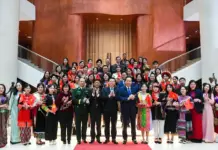In the two-day conference on ‘Terrorism and Radicalization in Jammu and Kashmir and the wider region,’ various experts and Kashmiri diaspora said that Pakistan in the name of jihad had continued its activities in Jammu and Kashmir which prompted radicalization and terrorism in the Union territories, according to the press statement released by the EFSAS.
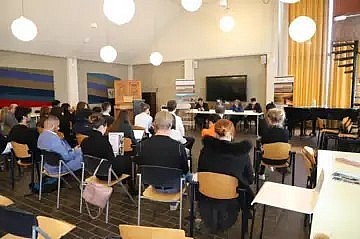 |
On the first day of the conference, Myra MacDonald, author of books on contemporary South Asian security and Former Reuters bureau chief for India, initially outlined that cultural narratives surrounding Jammu and Kashmir prior to the partition of British India in 1947 were frequently focused on Jammu and Kashmir as a physical space rather than emphasizing the idiosyncratic cultural identity of the region.
She further said that modern Jammu and Kashmir emerged as a result of the 1846 Treaty of Amritsar and has played a key role in the national imageries of both Pakistan and India. Pakistan, MacDonald discussed, has been founded on the notion of Pakistan being the sole homeland for Indian Muslims, with this religious narrative serving as the base for Pakistan’s claim to Jammu and Kashmir. India’s claim, in contrast, is based on the signed instrument of accession and secularism, providing the Indian claim with a less ideological narrative when compared to Pakistan, but with a sound legal foundation. This ideological fixation, she suggested, has resulted in the Pakistani Army dominating domestic politics and preventing democratization in the long run, forming a form of political-ideological prison.
She also stressed the early stages of the insurgency in Indian-administered Jammu and Kashmir and said that this was marked by human rights violations by both Pakistan-backed outfits and Indian security forces, with the insurgency enjoying little backing in the population, the statement reads.
MacDonald narrated that the highest possibilities for conflict resolution were witnessed under Manmohan Singh and Pervez Musharraf in the 2000s. Singh and his predecessor, Prime Minister Vajpayee, had started promising talks with Pakistani envoys that included an agreement on the legal transfer of territory, the LOC becoming an international border, and the permission for cross-border flows of people and goods. Maximum autonomy would be given to respectively held areas and frequent discussions would be held between Pakistani, Indian, and Kashmiri representatives. The negotiations ultimately failed due to Musharraf’s removal, the lack of public support in Pakistan for the agreement, and the 2008 Mumbai attacks carried out by Pakistani-sponsored Terrorist organizations. The attacks, she stressed, were so impactful because they targeted ordinary Indians rather than security infrastructure.
Since then, MacDonald concluded, Jammu and Kashmir have become even more fragmented. The revocation of Article 370 in India in 2019 has effectively rendered the division of the state a fait accompli, meaning that any conflict resolution can no longer focus on Jammu and Kashmir in its original borders. Resolutions could focus on establishing the LOC as an international border, formalizing the end of Jammu and Kashmir, the statement added.
The last speaker for the day, Daud Khattak, Managing Editor of Mashaal Radio, Radio Free Europe/Radio Liberty, discussed the ongoing terrorism and proliferation of extremist outfits in South Asia. He discussed how the contemporary issues of radicalization and terrorism in Jammu and Kashmir could be traced back to the use of proxies and the support for Kashmiri insurgents in the name of jihad by Pakistan. While Pakistani meddling in Jammu and Kashmir continues till the present day, the deep state has shifted its proxies from the tribal areas to Punjab, Khattak argued. Thus, the militancy started in the 1990s is composed of non-Kashmiri jihadists, such as Harkat-ul-Mujahideen, Lashkar-e-Taiba and Jaish-e-Mohammad, including Afghans and people who had previously fought in Afghanistan, such as members of the Haqqani tribe.
He further said that after the 9/11 incident, terrorist groups active in Kashmir increased their presence in the Pashtun tribal areas, ultimately also leading to the emergence of Tehrik-e-Taliban Pakistan. While Internal instability and international pressure seem to have limited the scope of Pakistani support for terror groups at the moment, its continuous assistance is visible through the protectionism they have extended to terrorist commanders. Despite being arrested and charged, Hafiz Saeed is still moving within Pakistan. Similarly, Masood Azhar is also hiding in the country despite contrary information in the media, Khattak added. He argued that other regional dynamics such as the building of the CPEC, the ongoing Baloch insurgency, the presence of organized crime groups and relations with Iran and the Central Asian States might bring further changes in Pakistan. Yet, when it comes to the Pakistani policy vis-a-vis terrorism and Kashmir, Khattak concluded by warning that ‘the dragon is fragile and sleepy but away from dead, and could wake up anytime, according to the statement.
On the second day of the conference, the panel include Kashmiris from both sides of the Line of Control (LoC).
Inspired by the university setting and the potential of students to shape the future, Shaukat Ali Kashmiri, Exiled Chairman of the United Kashmir Peoples National Party and Secretary General of Jammu Kashmir International People`s Alliance, spoke highly of the benefits of democracy. Kashmiri was adamant about the necessity of democracy to recognize people as inherently valuable despite any conflicting ideological or identity-related markers. Seeing the use of terrorism in his own home state of Jammu and Kashmir as both a foreign and domestic policy by the State of Pakistan, Kashmiri recounted the Pakistani military recruiting students to disseminate State propaganda and recruit other students to join so-called ‘Jihad’ in Jammu and Kashmir. Thus, Kashmiri claimed that it is the duty of the students to investigate and protest against injustice. The distortion of history by populist politicians and war-mongers is insensitive to those it harms and as such requires direct action.
He called for Pakistan to stop facilitating terrorism both within and beyond its borders, for it to recognize each citizen as human beings regardless of their ideological differences and for the international community to hold States like Pakistan accountable for their actions.
The final speaker, Junaid Qureshi, highlighted the privilege that comes with living in Europe. Qureshi, who is the director of EFSAS and is himself a Kashmiri, queried if the Jammu and Kashmir issue would still be as contentious as it is today had it taken place in closer proximity to Europe, like the war in Ukraine. A key element of Qureshi’s speech was his push for narrative change within the region which outlined the responsibility of individuals to accumulate knowledge and determine the truth for themselves. Emblematic of this is the radicalization process within the region, although the solution for this is collective as opposed to individualistic. Despite the issues of the region, Qureshi is emphatic that future peace is possible – as evidenced by the past century of conflict within the EU and now peaceful present. Ultimately, Qureshi struck a note of hope for the future if the necessary mechanisms of accountability and truth-verifying processes can be established.
On both days the events were followed by vibrant Question and Answer sessions with the students, who were avid to learn more about the issues the region of South Asia faces and how they themselves could get involved in finding fresh tangible solutions to those weary years of conflict.
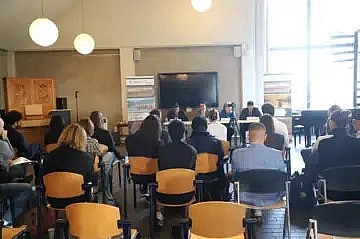 |
| 2 Day EFSAS Conference at VU University in Amsterdam started on November 1 and ended on the very next day. (ANI) |
2 Day EFSAS Conference at VU University in Amsterdam started on November 1 and ended on the very next day. (ANI).






